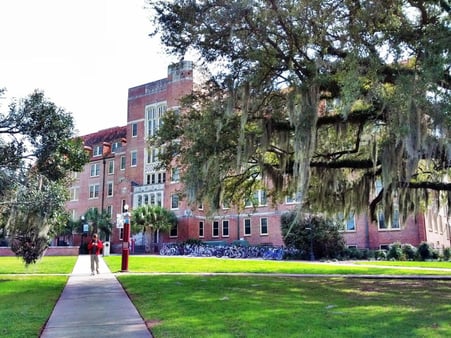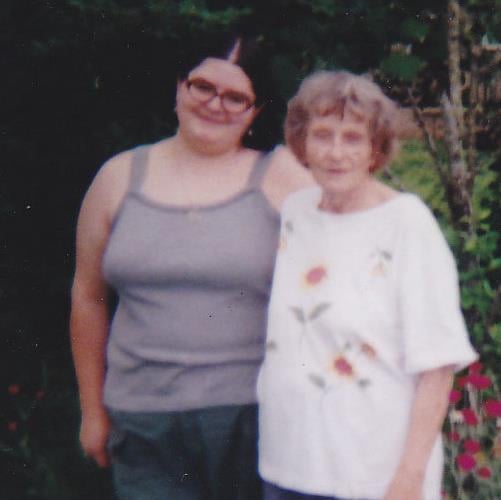My Mema (pronounced with an invisible w at the end) would have been 95 on January 13th. She was born and raised in the hills of north central Alabama on a farm with her three older sisters. She did the majority of the work of raising me, so I heard all the family stories: stealing watermelons, the things my great aunts got up to, the time she saw a coffin on the water of the creek - which is how they knew her daddy had died. She didn’t get to finish high school, but she told me how important reading and education were so I could “get out and be something.”
She took me to the library every Sunday afternoon and I maxed out my card every time. I worked hard, took all the honors classes my small school offered, and even when I was dealing with severe mental health issues, I made myself do all the things “bright” students were supposed to do because Mema said it was how I would “make good.” It helped me survive.
The older I got, the more I realized that I was one of very few people (and sometimes the only person) from a low income background in my honors classes. I grew up with some brilliant people from backgrounds similar to mine, but somehow they weren’t sitting next to me in AP English or Honors Algebra. I was surrounded by the daughters and sons of my town’s doctors, dentists, and business people. I asked one friend why she never pushed to be in those classes, and she said there was no way she could afford to go to college, so she didn’t really see the point. “People like us don’t get to do the same things as they do. Why get my hopes up?” College night reflected this well; there were a handful of community colleges and universities in attendance, but also the same number of military recruiters. Most of us weren’t expected to be college-bound.

As graduate students, we hear a lot about “imposter syndrome,” the feeling that no matter how hard you worked to get here or how smart you are, you aren’t worthy to be in this position and the fear that others will figure this out. People of all backgrounds suffer from this, but as I’ve finally met other grad students like me, I have come to know that it runs so much deeper for us. As a kid with high aspirations, you get told not to “get above your raisin’,” a more serious version of getting “too big for your britches.” Essentially, you get told this when you do something that makes it seem that you believe you are better than those around you. We start out with imposter syndrome before we ever receive our high school diplomas. Add in a queer identity, and many of us begin to feel as though there is no space on earth in which we really belong.
Fast forward 21 years: I’m just a semester or so away from earning my PhD, the fifth degree I’ll have—the only person in my family to go to grad school. Yes, I had some grants and scholarships along the way, but most of my education was paid for with loans, which I expected to be a part of higher education. What I never expected was the culture shock.
As an undergraduate, I met my first trust fund baby. I was the one person in my Women’s Studies classes who interjected the issues of the rural poor into the conversation. One classmate said, “I thought poor people only lived in cities. Farmers are wealthy, right?”

Once I crossed over into graduate school, things got even weirder. I was surrounded by people whose families were filled with professionals and graduate degrees. They grew up expecting that this was their future. At receptions, I was often met with a face and tone that said, “You do not belong here.” As someone from rural Alabama, I usually speak with a fairly obvious southern accent. Just a few months ago, while having a conversation with someone about what I do, they stopped me and said, “You don’t sound like you’re getting a PhD.” Apparently, people with thick southern accents are not smart enough to earn doctorates. When people find out where I’m from, they have been known to tell me that it’s so amazing that I’ve made it this far because people where I’m from don’t usually do so. “You do not belong here.”
When I graduated from high school, Mema was in the audience. She drove me to college. On that drive, she told me, “You won’t ever have to pick cotton or get married if you don’t want to. You don’t belong in a garment factory,” - where she worked for years – “you belong in school.” My Mema passed away in September of 2010. She didn’t live to see me finish my bachelor’s degrees or get my master’s, and she won’t see me become Dr. Betts-Green. But I know she would have been proud. She always believed I belonged, and I’m finally starting to believe it myself. Here’s hoping we all believe it of ourselves in the end.
 This post was written by Point Scholar Dawn Betts-Green.
This post was written by Point Scholar Dawn Betts-Green.
Dawn is currently working toward a PhD at Florida State University School of Information. Dawn finished her undergraduate education at FSU with a bachelor’s degrees in Women’s Studies, Religion, and Creative Writing. She went on to earn a Masters in Library and Information Studies with a certificate in Youth Services. Read more about Dawn here.

